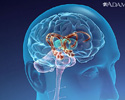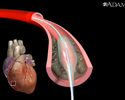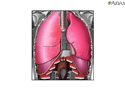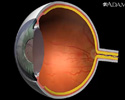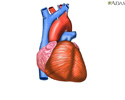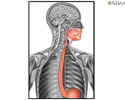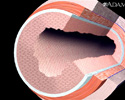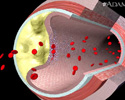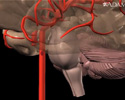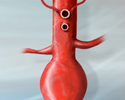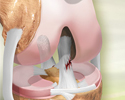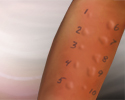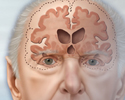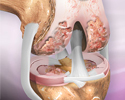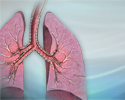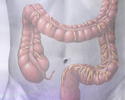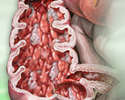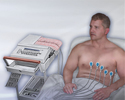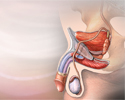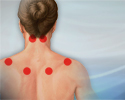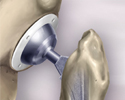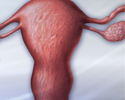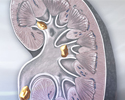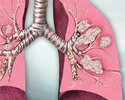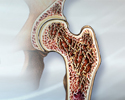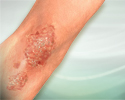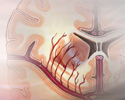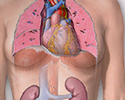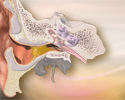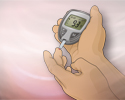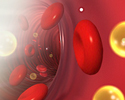Sleep disorders
You tuck yourself under the covers, turn out the light, and look forward to eight hours of blissful slumber. But, after turning for hours you're still exhausted, and no closer to sleep than when you first got into bed. Let's talk today about sleep disorders. Sleep disorders fall into four basic categories. The scenario I described, in which you toss and turn because you can't fall asleep, is called insomnia. Another type of insomnia is when you wake up in the middle of the night and can't get back to sleep. Sometimes people get insomnia for a night or two because they're stressed out over a big meeting at work, or they're excited about an upcoming trip. Others can't sleep night after night, and that's called chronic insomnia. People with the second category of sleep disorders have a hard time staying awake during the day, even if they slept well the night before. This is called hypersomnia. Sometimes doctors can't find a cause for hypersomnia. But in many cases, a health condition like fibromyalgia, a thyroid problem, a disease like mononucleosis, obesity, or obstructive sleep apnea, can make you sleepy. If you notice a co-worker is nodding off in the middle of meetings, he might have narcolepsy, a sleep disorder that causes people to sleep uncontrollably at inappropriate times during the day. Narcolepsy isn't only embarrassing, it can be dangerous if you nod off behind the wheel of a car. A sleep rhythm problem means that you can't stick to a normal sleep schedule. Maybe you work the night shift at your job, or you're always traveling to different time zones and are constantly battling jet lag. Well, whatever the cause, the lack of a normal sleep pattern is called a sleep rhythm disorder. And finally, there are the types of sleep disorders that wake you up with a jolt in the middle of the night, and, these are called parasomnias, and they can severely interrupt your sleep. You may walk in your sleep, or act out your dreams. Children often have night terrors, in which they wake up from a deep sleep in a terrified state. The good news is that you don't have to live on fewer hours of sleep, because there are decent treatments for sleep disorders. If you're struggling to sleep throughout the night, and dragging through the day as a result, talk to your doctor, who can refer you to a sleep specialist for an evaluation.
Sleep disorders
Review Date: 9/15/2024
Reviewed By: Jacob Berman, MD, MPH, Clinical Assistant Professor of Medicine, Division of General Internal Medicine, University of Washington School of Medicine, Seattle, WA. Also reviewed by David C. Dugdale, MD, Medical Director, Brenda Conaway, Editorial Director, and the A.D.A.M. Editorial team.
Animations
Browse All
- Allergies
- Alzheimer disease
- Ankle ligament injury
- Arrhythmias
- Atherosclerosis
- Athetosis resulting from basal...
- Balloon angioplasty - short se...
- Bladder function - neurologica...
- Blinking
- Blood clotting
- Blood flow
- Blood pressure
- Bone fracture repair
- Brain components
- Breast lift
- Breathing
- Bunion
- Cancer of the throat or larynx...
- Cardiac conduction system
- Cardiomyopathy
- Cardiovascular system
- Cataract
- Cell division
- Cerebral aneurysm
- Cesarean section
- Components of skin
- Conception - general
- Conception - pregnancy
- Conception of identical twins...
- Concussion
- Corneal injury
- Coronary artery bypass graft (...
- Coronary artery disease
- Cosmetic surgery of the face
- Coughing
- Diabetes - retinal conditions...
- Digestion
- Directional coronary atherecto...
- Early labor
- Egg cell production
- Egg production
- Endocrine glands
- Enlarged prostate gland
- Epinephrine and exercise
- Exercise
- Feeling pain
- Fetal ear development
- Formation of twins
- Gas exchange
- Glaucoma
- Gout
- Hearing
- Hearing and the cochlea
- Heart bypass surgery
- Heart formation
- Heartbeat
- Heartburn
- Herniated nucleus pulposus (sl...
- Homeostasis
- Human face formation
- Hypertension - overview
- Immune response
- Kidney stones
- Kids - How big is the baby?
- Kids - How does the baby come ...
- Kids - Is it a girl or boy?
- Kids - Umbilical cord
- Kids - Where do babies come fr...
- Liposuction
- Lymph nodes
- Lymphatics and the breast
- Macular degeneration
- Muscle types
- Nerve conduction
- Nervous system formation
- Nutrient exchange
- Osteoarthritis
- Osteoporosis
- Ovulation
- Parkinson disease
- Percutaneous transluminal coro...
- Peristalsis
- Phagocytosis
- Pituitary gland
- Placenta delivery
- Placenta formation
- Preeclampsia
- Pregnancy
- Red blood cell production
- Reflex response
- Retina
- Retinal detachment
- Rupturing membranes
- Seeing
- Sexual differentiation
- Shoulder joint dislocation
- Skeletal formation
- Skeletal muscle
- Skeletal system components
- Skin conditions
- Smelling
- Smoking
- Snoring
- Sperm production
- Sperm release pathway
- Stomach ulcer
- Stomach ulcer
- Stroke
- Stroke - secondary to cardioge...
- Sun's effect on skin
- Swallowing
- Sweating
- Tachycardia
- Tasting
- The role of amniotic fluid
- Tobacco use - effects on arter...
- Twin-to-twin transfusion syndr...
- Ultrasound
- Urination
- Vaccines
- Vaginal delivery
Videos
Browse All
- Diabetes
- Abdominal aortic aneurysm
- Abdominal pain
- ACL injury
- Acne
- Adenoid removal
- Adolescent depression
- After your child's ear tube su...
- After your child's inguinal he...
- After your child's tonsil or a...
- After your child's umbilical h...
- Alcoholic liver disease
- Allergic rhinitis
- Allergies
- Allergy testing
- Allergy to mold - animal dande...
- Alzheimer disease
- Anemia
- Ankylosing spondylitis
- Anterior shoulder stretch
- Anti-reflux surgery
- Appendectomy
- Appendicitis
- Arm reach
- Arthritis
- Asperger syndrome
- Asthma
- Asthma - children
- Atopic dermatitis
- Atrial fibrillation
- Attention deficit hyperactivit...
- Autism spectrum disorders
- Basal cell carcinoma
- Before a child's tonsil or ade...
- Bipolar disorder
- Breast cancer
- Breast engorgement
- Breast self-exam
- Breastfeeding
- Bronchitis
- Bronchoscopy
- Cardiac catheterization
- Carpal tunnel syndrome
- Cataracts
- Cerebral palsy
- Cervical cancer
- Chest pain
- Childhood obesity
- Cholesterol and triglyceride t...
- Chronic obstructive pulmonary ...
- Cluster headache
- Cold treatments for kids
- Colon cancer
- Colon cancer screening
- Colorectal polyps
- Common cold
- Concussion
- Crohn disease
- C-section
- Cystic fibrosis
- Cystic fibrosis - nutritional ...
- Depression
- Dialysis
- Diarrhea
- Ear infection - acute
- Ear infection - chronic
- Ear tube insertion
- Earache
- Electrocardiogram
- Endometriosis
- Enlarged adenoids
- Enlarged prostate
- Epilepsy
- Erection problems
- Essential hypertension
- External rotation with band
- Fibromyalgia
- Flu
- Food poisoning
- Foot pain
- Gallstones
- Gastroesophageal reflux diseas...
- Gastroesophageal reflux in inf...
- Getting rid of lice in the hom...
- Glaucoma
- Hardening of arteries
- HbA1c
- Head injury
- Head lice
- Healthy Guide to Fast Food
- Hearing loss
- Heart attack
- Heart failure
- Heel pain
- Hepatitis A
- Hepatitis B
- Hepatitis C
- Hernia
- Herniated disk
- Hip joint replacement
- Hodgkin lymphoma
- How do ear tubes come out?
- How to remove a splinter
- How to stop bedwetting
- How to treat a nosebleed
- How to treat a sunburn
- How to use a peak flow meter
- How to use a pill cutter
- How to use eye drops
- How to use nasal sprays
- Hypertension
- Hyperthyroidism
- Hypothyroidism
- Hysterectomy
- Infant formulas
- Inguinal hernia repair
- Inhaler with no spacer - adult...
- Inhaler with no spacer - child...
- Inhaler with spacer - adults
- Inhaler with spacer - child
- Insomnia
- Internal rotation with band
- Iron deficiency anemia
- Irritable bowel syndrome
- Isometric
- Kidney stones
- Knee joint replacement
- Let's talk about pink eye
- Lung cancer
- Lyme disease
- Melanoma
- Menopause
- Migraine
- Multiple sclerosis
- Nasal congestion
- Neck pain
- Newborn jaundice
- NICU consultants and support s...
- Nuclear stress test
- Obstructive sleep apnea
- Osteoarthritis
- Osteoporosis
- Pap smear
- Pendulum exercise
- Peptic ulcer
- Pharyngitis
- Plantar fasciitis
- Pneumonia
- Pregnancy care
- Prepare for your child's ear t...
- Prepare for your child's herni...
- Prostate cancer
- Psoriasis
- Rheumatoid arthritis
- Rotator cuff problems
- Sciatica
- Scoliosis
- Seizures
- Shingles
- Shoulder blade retraction
- Shoulder blade retraction with...
- Shoulder pain
- Sinusitis
- Sleep disorders
- Smoking tips to quit
- Spinal stenosis
- Stent
- Storing breast milk
- Strep throat
- Stretching back of your should...
- Stroke
- Systemic lupus erythematosus
- Tension headache
- The difference between a cold ...
- Tips on buying cold and flu me...
- Tips on removing ear wax
- Tonsillectomy
- Tonsillitis
- Tracking your blood pressure a...
- Treating congestion in babies...
- Treating eyelid bumps
- Type 1 diabetes
- Type 2 diabetes
- Ulcerative colitis
- Understanding cholesterol resu...
- Up the back stretch
- Urinary incontinence
- Uterine fibroids
- Vacation health care
- Varicose veins
- Venous insufficiency
- Wall push-up
- Wall stretch
- Warts
- What are hives?
- What are night terrors?
- What causes wheezing?
- What in the world is a neti po...
- What is tennis elbow?
- What makes your heart beat?
- What to do when kids put thing...
- What to do when kids put thing...
- What to do when something gets...



